| Srl | Item |
| 1 |
ID:
139208
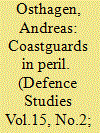

|
|
|
|
|
| Summary/Abstract |
Defence collaboration is on the political agenda in most western countries. Simultaneously, maritime activity in the Arctic region is growing, spurring demand for various coast guard tasks of both civilian and military characters. How can defence collaboration be applied to deal with a changing situation in the Arctic? Arctic coastal states are facing heightened risks, and their various coast guard structures have to provide extended capacities for a number of tasks. Simultaneously, most Arctic coast guards are experiencing a stretch in capabilities, as demand grows. This study asks whether it is purposeful – or even possible – to conduct defence collaboration on coast guard tasks in the Arctic. Subsequently, what are the drivers of, and challenges to, such collaboration, and what forms can it take? Canada, Denmark and Norway form the basis of this comparative study, given their status as NATO members and small-to-medium powers with prominent geographical positions in the North Atlantic/Arctic oceans.
|
|
|
|
|
|
|
|
|
|
|
|
|
|
|
|
| 2 |
ID:
139209
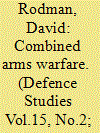

|
|
|
|
|
| Summary/Abstract |
Traditional combined arms warfare is premised on the assumption that a symmetrical mix of different kinds of units and weapons offers an army the best prospect of achieving optimal results on the battlefield. The Israel Defense Forces (IDF) has been accused by critics over the years of essentially abandoning the practice of traditional combined arms warfare before the 1973 Yom Kippur War in favor of a nontraditional (asymmetrical) variant that relied much too heavily on tanks and aircraft. While this criticism certainly has substantial merit, the IDF’s reverses in the early days of the war were not due solely to a lack of emphasis on traditional combined arms warfare, but rather also to a “perfect storm” of circumstances that obtained at the outset of hostilities. To its credit, the IDF learned rapidly from its prewar mistakes in force structure and war-fighting doctrine, reverting within days to a traditional approach to the practice of combined arms warfare, at least on the ground. Though not a battlefield panacea by any means, traditional combined arms warfare clearly contributed to the IDF’s eventual victory in the war.
|
|
|
|
|
|
|
|
|
|
|
|
|
|
|
|
| 3 |
ID:
139206
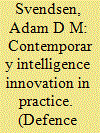

|
|
|
|
|
| Summary/Abstract |
Currently, “macro” systems thinking is arguably most evident in intelligence studies. Appearing especially apparent are characterisations of different intelligence architectures, strongly associated with grander-ranging national or central intelligence systems and their associated machinery, even being bounded as intelligence communities. Following on from noteworthy US defence sector developments, which have demonstrable relevance both to and for closely overlapping contemporary intelligence work, more “micro” systems thinking – namely involving intelligence-related “System of Systems” (“SoS”) concepts – is increasingly emergent. For helping to facilitate and better understand contemporary intelligence innovation, SoS constructs and their dynamics are now deserving of being further examined and refined. This includes as they pertain to the conduct of several multifunctional and special operations occurring across the world during an overall era of globalised strategic risk, and as the study and practice of intelligence aims towards further extension and adaptive transformation.
|
|
|
|
|
|
|
|
|
|
|
|
|
|
|
|
| 4 |
ID:
139207
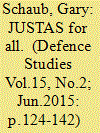

|
|
|
|
|
| Summary/Abstract |
Canada owns and uses unmanned aerial vehicles (UAVs), but its military services have acquired and integrated them into their force structure and operations with different degrees of ease. Service differences are explained with a three variable innovation adoption framework that integrates cost, impetus, and disruptive nature. The Army and Navy framed UAVs as relatively inexpensive adaptive innovation that would help avoid operational failures. The Air Force framed UAVs as expensive disruptive innovation that could improve performance of core functions but experienced UAVs as inexpensive adaptive innovations that helped avoid operational failure; yet these successes were perceived as inadequate. Analyzing services captures processes that national studies miss.
|
|
|
|
|
|
|
|
|
|
|
|
|
|
|
|
| 5 |
ID:
139205
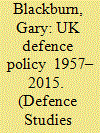

|
|
|
|
|
| Summary/Abstract |
This paper uses the strategic dimensions concept and content analysis of nine key defence white papers published between 1957 and 2010 to assess which factors most influence declaratory policy. The paper also notes that the development of defence policy has been accompanied by the “muddling through” vs. decisive choice debate which reflects the tensions within policy between the thesis of strategy and the antithesis of fiscal parsimony. The paper maintains that defence policy is ultimately contingent upon external threats and it is these, rather than the desire to economise, which are the key policy drivers. It concludes that this extrinsic factor will determine the outcome of the next SDSR and though this is not necessarily incongruent with the desire to economise, events may prove otherwise.
|
|
|
|
|
|
|
|
|
|
|
|
|
|
|
|
| 6 |
ID:
139210
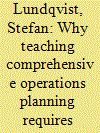

|
|
|
|
|
| Summary/Abstract |
This article argues that the method outlined in NATO’s Comprehensive Operations Planning Directive (COPD) manual is entirely based on systems theory and describes how to apply the principles for managing system change through comprehensive operations projects. Such systems thinking is based on conceptually different principles than traditional military planning methods. Students must therefore be provided with new conceptual tools to understand and handle the complex planning process outlined in the COPD manual. Thereto, they require knowledge of its founding scientific theories to meet academic standards. The concluding message is that military teachers and students must widen their individual mental frames of reference through a transformational learning process to obtain the comprehensive understanding required to fully manage the COPD process. Moreover, they need to prepare for facilitating dialogues in the less mature comprehensive operations planning teams of real-life situations.
|
|
|
|
|
|
|
|
|
|
|
|
|
|
|
|